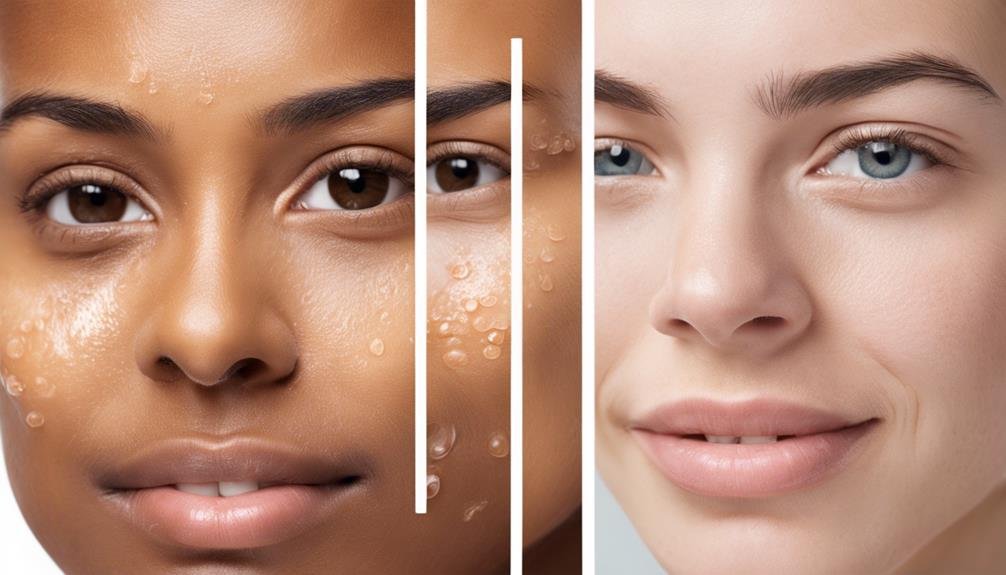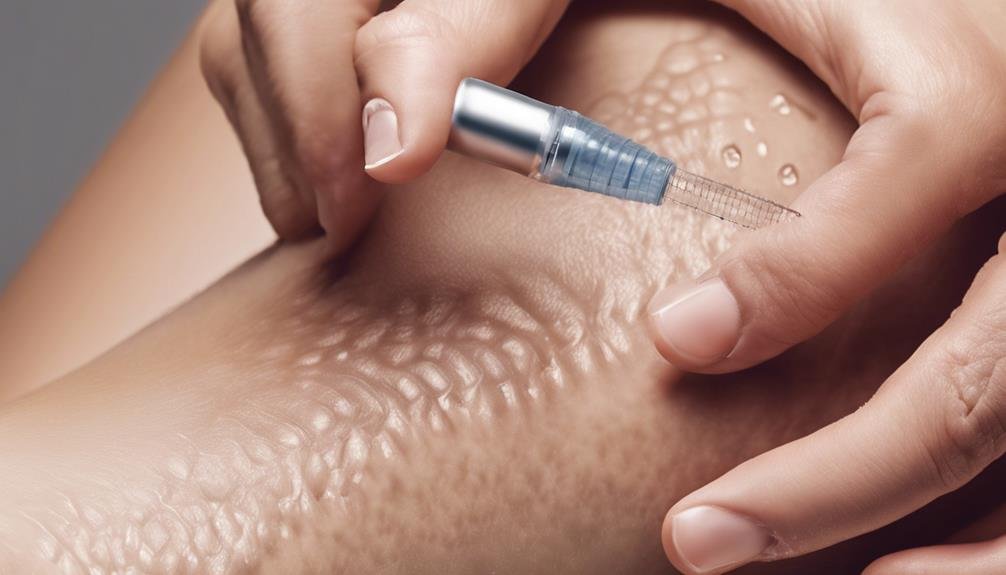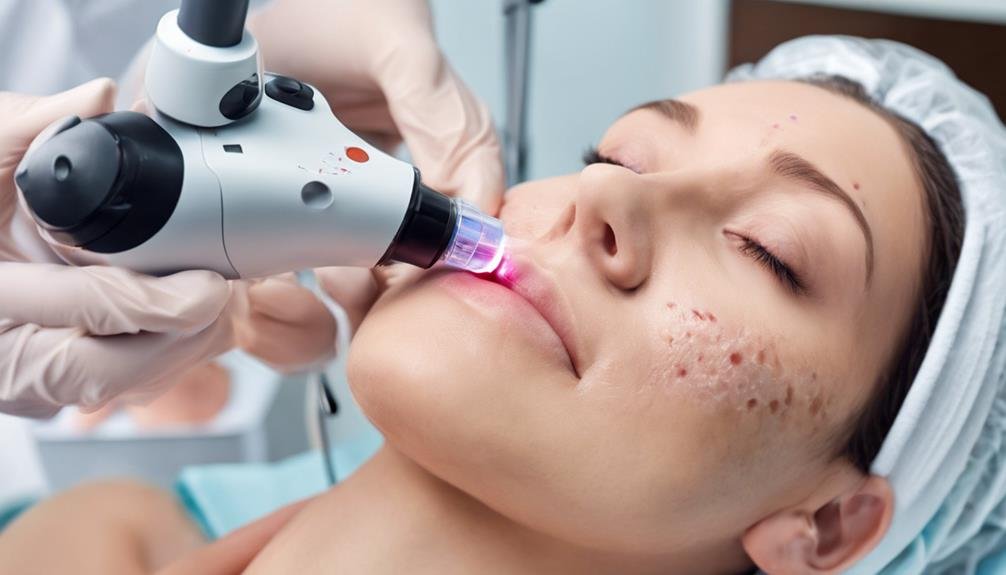You may have noticed that acne scars can linger longer than you'd like. Don't fret; there are effective ways to address them and restore your skin's clarity. By exploring a combination of advanced skincare treatments and targeted ingredients, you can significantly diminish the appearance of acne scars and achieve smoother, more even-toned skin. From professional procedures like microneedling and chemical peels to potent topical solutions, the path to fading acne scars is within reach. Stay tuned to discover the comprehensive strategies that can help you on your journey to a clearer complexion.
Key Takeaways
- Use retinoids to promote collagen production and improve skin texture.
- Incorporate niacinamide to reduce redness and hyperpigmentation in scars.
- Consider chemical peels for exfoliation and collagen induction.
- Opt for Vitamin C to promote collagen synthesis and reduce inflammation.
- Explore laser therapy for stimulating collagen production and targeting damaged skin cells.
Understanding Acne Scars
To effectively address acne scars, it's crucial to first understand the different types and causes of these skin imperfections. Acne scars can manifest in various forms, including atrophic, hypertrophic, and keloid scars.
Atrophic scars result from a loss of tissue, creating indentations in the skin, while hypertrophic and keloid scars are raised and occur due to excess collagen production during the healing process.
The primary cause of acne scars is inflammation that damages the skin's collagen structure, leading to alterations in the skin's texture and appearance.
Factors such as the severity of acne, genetics, skin type, and improper acne treatment can contribute to the development of acne scars. Understanding the specific type of acne scar you have is essential for choosing the most effective treatment options.
Consulting with a dermatologist can help you determine the best course of action to address your acne scars based on their type and severity. By gaining a deeper understanding of acne scars, you can make informed decisions about how to fade them effectively.
Importance of Sun Protection
Understanding the impact of sun exposure on acne scars is key to effectively managing their appearance. Sun protection plays a crucial role in preventing further damage and aiding in the fading process. Here are some essential points to keep in mind:
- Sunscreen Is Your Best Friend: Always use a broad-spectrum sunscreen with an SPF of 30 or higher to shield your skin from harmful UV rays.
- Avoid Peak Sun Hours: Try to stay out of the sun during its peak hours, typically between 10 a.m. and 4 p.m., to reduce sun damage to your skin.
- Cover Up: Wearing hats, sunglasses, and protective clothing can provide an extra layer of defense against the sun's damaging effects on your acne scars.
Topical Treatments for Fading Scars
Enhancing the appearance of acne scars often involves incorporating topical treatments into your skincare routine. When choosing a topical treatment for fading scars, look for ingredients like retinoids, which can help improve skin texture and promote collagen production. Retinoids work by increasing cell turnover, aiding in the fading of acne scars over time.
Another effective ingredient is niacinamide, known for its anti-inflammatory properties that can help reduce redness and hyperpigmentation associated with acne scars. Additionally, products containing alpha hydroxy acids (AHAs) like glycolic acid can help exfoliate the skin, leading to a smoother complexion and potentially reducing the appearance of scars.
When using topical treatments, remember to start slowly to allow your skin to adjust and always follow up with sunscreen during the day to protect your skin from further damage. By incorporating these topical treatments into your skincare routine, you can work towards fading acne scars and achieving a more even skin tone.
Incorporating Vitamin C
When incorporating Vitamin C into your skincare routine to address acne scars, you're tapping into a powerful antioxidant known for its skin-brightening and collagen-boosting properties. Vitamin C can help fade acne scars by promoting collagen production, reducing inflammation, and protecting the skin from oxidative stress. Here's how you can effectively incorporate Vitamin C into your skincare routine:
- Choose the Right Product: Look for serums or creams containing stable forms of Vitamin C like ascorbic acid or sodium ascorbyl phosphate.
- Apply in the Morning: Vitamin C works well when applied in the morning to protect against environmental aggressors throughout the day.
- Start Slowly: If you're new to Vitamin C, start with a lower concentration to avoid irritation and gradually increase the dosage as your skin builds tolerance.
Benefits of Retinoids
To fully grasp the transformative effects of retinoids on acne scars, consider the remarkable benefits this potent ingredient offers to your skincare regimen. Retinoids, derived from Vitamin A, are renowned for their ability to enhance skin cell turnover and stimulate collagen production, crucial for fading acne scars. Here are some key benefits of incorporating retinoids into your skincare routine:
| Benefit | Description | Evidence |
|---|---|---|
| Accelerated Cell Renewal | Retinoids promote the shedding of dead skin cells, revealing fresh skin underneath | Dermatologic Surgery study showed increased cell turnover with retinoid use |
| Collagen Boost | Stimulates collagen synthesis, aiding in the repair of acne scarred skin | Journal of Drugs in Dermatology reported improved collagen production with retinoids |
| Improved Skin Texture | Smooths skin texture by reducing fine lines, wrinkles, and acne scars | Clinical studies show enhanced skin texture with retinoid application |
Integrating retinoids into your skincare routine can significantly improve the appearance of acne scars, providing you with smoother and more radiant skin.
Exfoliation Techniques
Revitalize your skincare routine by exploring effective exfoliation techniques that can help in achieving smoother, clearer skin. Exfoliation is a key step in fading acne scars as it helps in removing dead skin cells and promoting skin cell turnover. Here are some recommended exfoliation techniques for you to consider:
- Chemical Exfoliants: Incorporate alpha-hydroxy acids (AHAs) like glycolic acid or beta-hydroxy acids (BHAs) such as salicylic acid into your routine. These chemical exfoliants work by breaking down dead skin cells and unclogging pores, leading to smoother skin texture.
- Physical Exfoliation: Utilize a gentle scrub or exfoliating tool to physically remove dead skin cells. Be cautious not to be too harsh, as aggressive scrubbing can irritate the skin and worsen acne scars.
- Enzyme Exfoliation: Enzyme exfoliants like papain from papaya or bromelain from pineapple work by dissolving dead skin cells gently. These are suitable for sensitive skin types.
Experiment with these exfoliation techniques to find what works best for your skin, but remember to exfoliate gently and not overdo it, as too much exfoliation can lead to irritation and damage.
Hydration and Moisturization
Proper hydration and moisturization are essential components of a healthy skincare routine, particularly when aiming to fade acne scars. Hydrated skin is more resilient and better able to repair itself, aiding in the fading of acne scars over time.
When choosing a moisturizer, look for non-comedogenic options to prevent clogged pores and breakouts. Ingredients like hyaluronic acid, glycerin, and ceramides help to maintain skin hydration levels and improve overall skin health.
Incorporating a hydrating serum into your routine can also boost the skin's moisture content, promoting healing and reducing the appearance of acne scars. Serums containing vitamin C or niacinamide are known for their brightening and skin-repairing properties, making them beneficial for scar fading.
Remember to drink an adequate amount of water daily to keep your skin hydrated from within. Hydration is key to maintaining skin elasticity and promoting the skin's natural healing processes. Combined with a consistent moisturizing routine, proper hydration can significantly contribute to the fading of acne scars over time.
Professional Treatments Overview
Maintaining a consistent skincare routine is vital for addressing acne scars, but in some cases, professional treatments may offer more targeted and accelerated results. When considering professional treatments for acne scars, here are some options to explore:
- Chemical Peels: These treatments involve applying a chemical solution to the skin to exfoliate the top layers. This can help improve the appearance of acne scars by promoting cell turnover and collagen production.
- Laser Therapy: Laser treatments target specific areas of scarring, stimulating collagen production and resurfacing the skin to reduce the appearance of scars.
- Microdermabrasion: This procedure involves gently exfoliating the skin to remove the outer layer, promoting new skin growth and potentially reducing the visibility of acne scars.
Professional treatments can be effective in addressing acne scars, but it's essential to consult with a dermatologist or skincare professional to determine the most suitable option for your skin type and scar severity.
Microneedling for Scar Reduction
To effectively reduce the appearance of acne scars, microneedling is a popular treatment option that can help improve skin texture and promote collagen production. Microneedling, also known as collagen induction therapy, involves using a device with tiny needles to create controlled micro-injuries on the skin's surface. These micro-injuries stimulate the skin's natural healing process, leading to increased collagen and elastin production. Collagen is essential for maintaining skin elasticity and firmness, while elastin helps the skin bounce back from stretching and contracting.
During a microneedling session, a numbing cream is typically applied to minimize discomfort. The procedure itself may cause mild redness and swelling, which usually subside within a few days. Results from microneedling can vary, but many people notice an improvement in their acne scars after a series of treatments.
It's essential to follow post-treatment care instructions provided by your skincare professional to optimize results and minimize the risk of complications. Consult with a dermatologist or skincare specialist to determine if microneedling is right for you.
Chemical Peels for Renewed Skin
Chemical peels are a popular cosmetic procedure used to improve skin texture and address various skin concerns, including acne scars. These peels involve applying a chemical solution to the skin, which causes the skin to exfoliate and eventually peel off, revealing smoother, renewed skin underneath. Here are some key points to consider:
- Types of Chemical Peels: There are different types of chemical peels available, ranging from superficial peels that target the outer layer of the skin to deeper peels that penetrate into the middle layer of the skin.
- Benefits of Chemical Peels: Chemical peels can help reduce the appearance of acne scars, fine lines, sun damage, and uneven skin tone. They can also stimulate collagen production, leading to firmer and more youthful-looking skin.
- Post-Treatment Care: It's important to follow your dermatologist's post-treatment instructions carefully to ensure proper healing and optimal results. This may include avoiding sun exposure, using gentle skincare products, and staying hydrated to support skin recovery.
Laser Therapy for Acne Scars
When considering treatment options for acne scars, laser therapy emerges as a promising solution. Laser therapy works by stimulating collagen production and targeting the damaged skin cells, resulting in the fading of acne scars. The treatment is non-invasive and can be customized based on the type and severity of your scars.
There are different types of laser treatments available, such as ablative lasers that remove thin layers of skin, and non-ablative lasers that promote collagen production without damaging the skin's surface. Your dermatologist will recommend the most suitable option for your specific needs.
Laser therapy for acne scars typically requires multiple sessions for optimal results. While you may experience some redness or swelling after the treatment, these side effects are temporary and subside quickly.
It's essential to consult with a qualified dermatologist or skincare professional to determine if laser therapy is the right choice for you. They can assess your skin condition and recommend a personalized treatment plan to help you achieve smoother, clearer skin.
Home Remedies for Scar Healing
Considering alternative options for scar healing outside of professional treatments like laser therapy, exploring home remedies can be a cost-effective and convenient approach. Here are three home remedies that can help in the healing process:
- Aloe Vera: Known for its soothing properties, aloe vera can aid in reducing inflammation and promoting skin regeneration. Applying fresh aloe vera gel directly to the scarred area can help improve the appearance of acne scars over time.
- Honey: With its antibacterial and moisturizing properties, honey can be beneficial for scar healing. Applying raw honey to the affected area and leaving it on for about 10-15 minutes before rinsing off can help promote healing and reduce scar visibility.
- Rosehip Seed Oil: Rich in essential fatty acids and antioxidants, rosehip seed oil is known for its skin regeneration properties. Massaging a few drops of rosehip seed oil onto the scars daily can help improve skin texture and fade acne scars gradually.
These home remedies, when used consistently and in conjunction with a healthy skincare routine, can contribute to the fading of acne scars over time.
Frequently Asked Questions
Can Acne Scars Be Completely Removed?
Yes, acne scars can be significantly reduced through various treatments like laser therapy, microneedling, and chemical peels. Complete removal may not always be possible, but with consistent care, you can greatly improve their appearance.
How Long Does It Take to See Results From Scar Treatments?
Results from scar treatments vary. Typically, improvement starts becoming noticeable after a few weeks to a few months. Consistent use of recommended products and treatments speeds up the process. Patience and adherence to the regimen are key.
Are There Any Foods That Can Worsen Acne Scarring?
Avoid foods high in sugar, processed carbohydrates, and dairy, as they may exacerbate acne scarring. Opt for a diet rich in fruits, vegetables, whole grains, and lean proteins to support skin health and potentially reduce scarring.
Can Makeup Worsen Acne Scars?
Wearing makeup can potentially worsen acne scars if it clogs pores or contains irritating ingredients. Look for non-comedogenic and hypoallergenic products. Prioritize makeup removal and skincare routines to promote scar healing. Consult a dermatologist for tailored advice.
Are There Any Side Effects From Professional Scar Treatments?
Professional scar treatments may have side effects like redness, swelling, or itching. However, these are often temporary and subside with time. It's crucial to follow post-treatment care instructions to minimize any potential discomfort and maximize results.
Conclusion
In conclusion, incorporating topical treatments like retinoids and niacinamide, along with consistent sun protection, can help fade acne scars and improve skin texture. Did you know that a study found that 87% of participants saw improvement in their acne scars after using a combination of topical treatments and in-office procedures? Remember to consult with a dermatologist for personalized treatment options to effectively reduce the appearance of acne scars.







